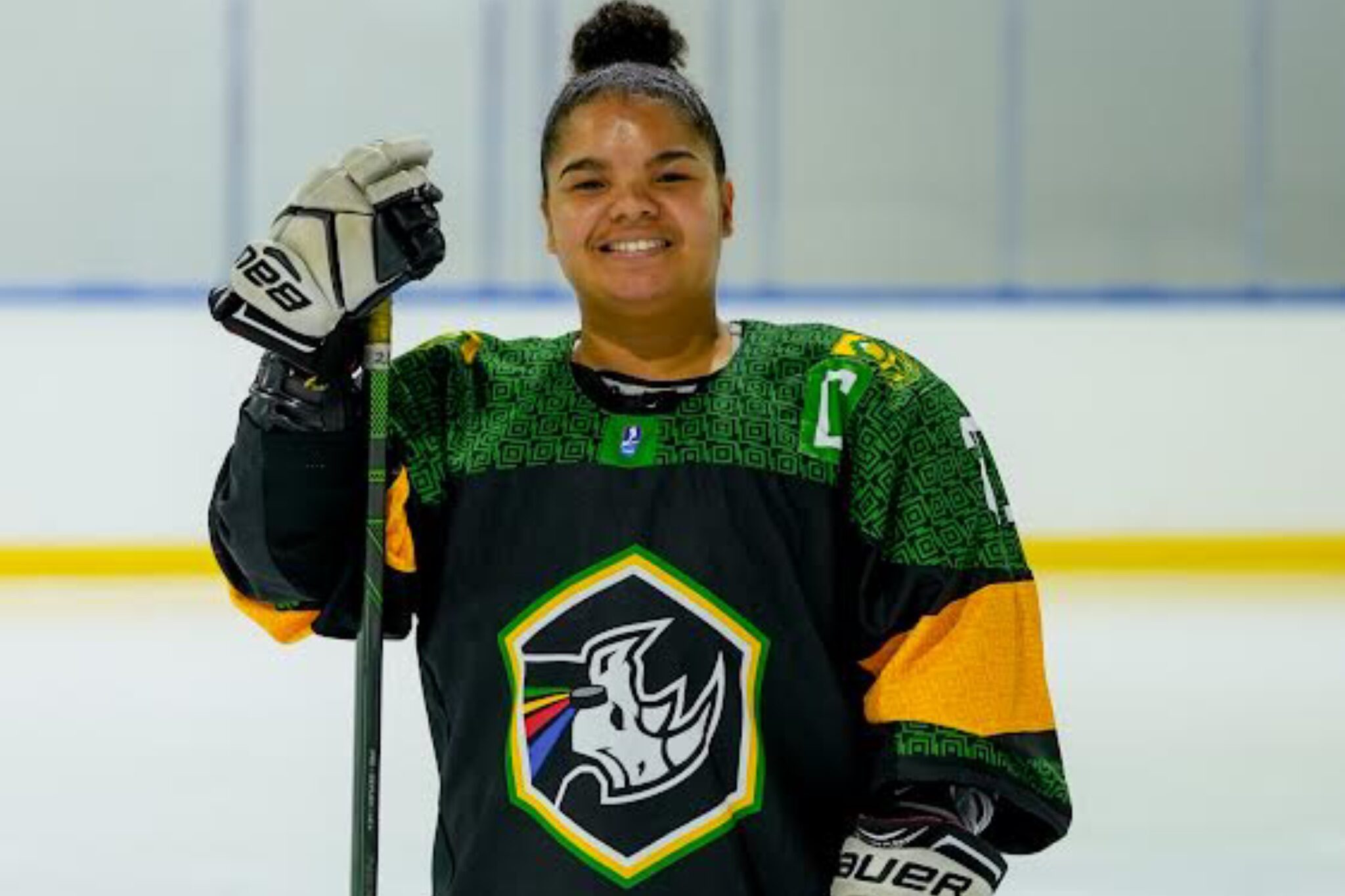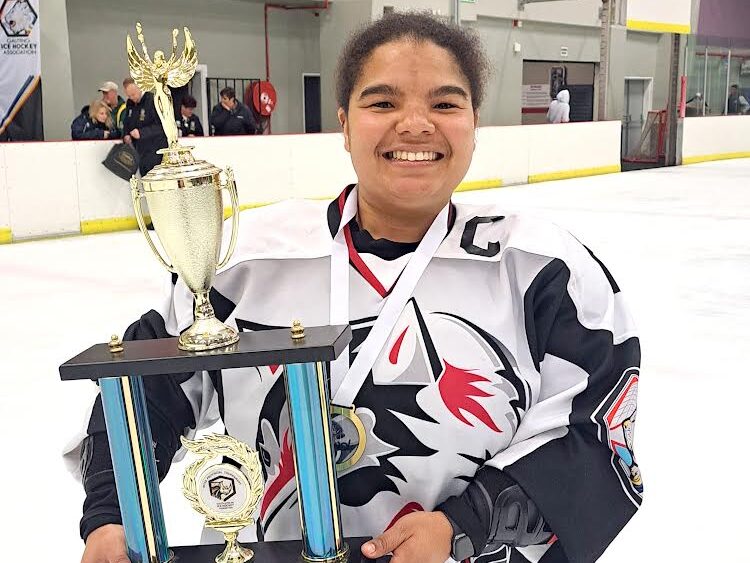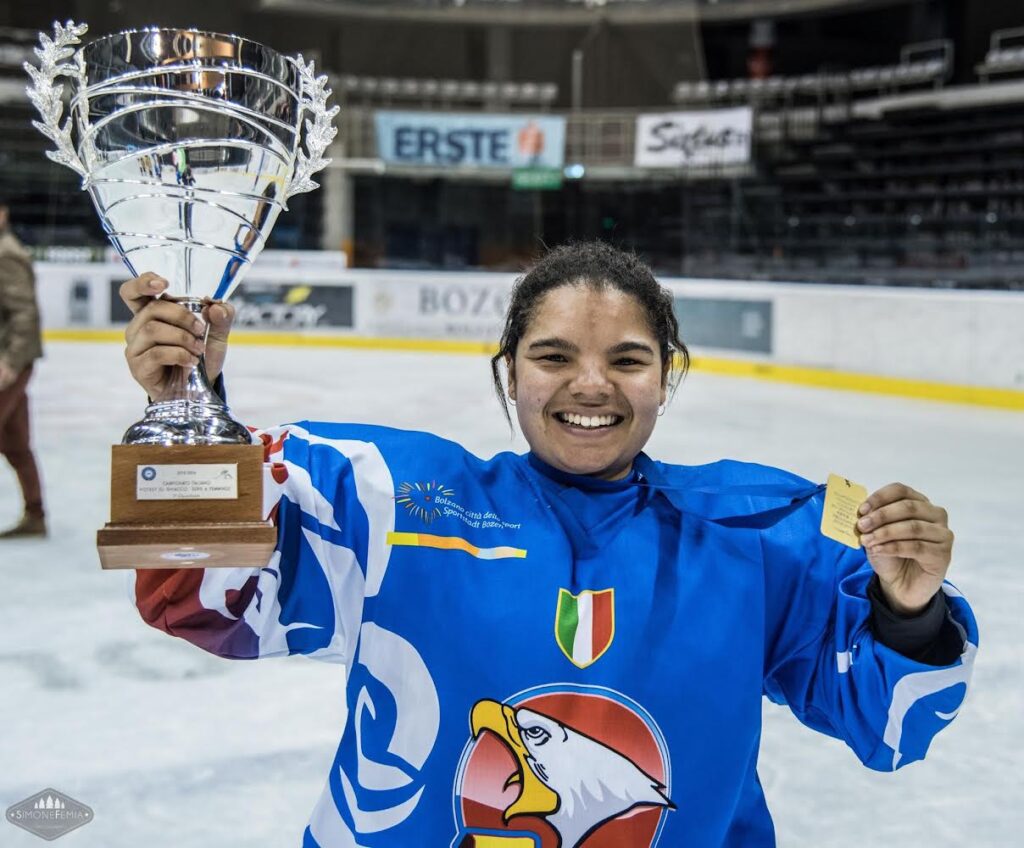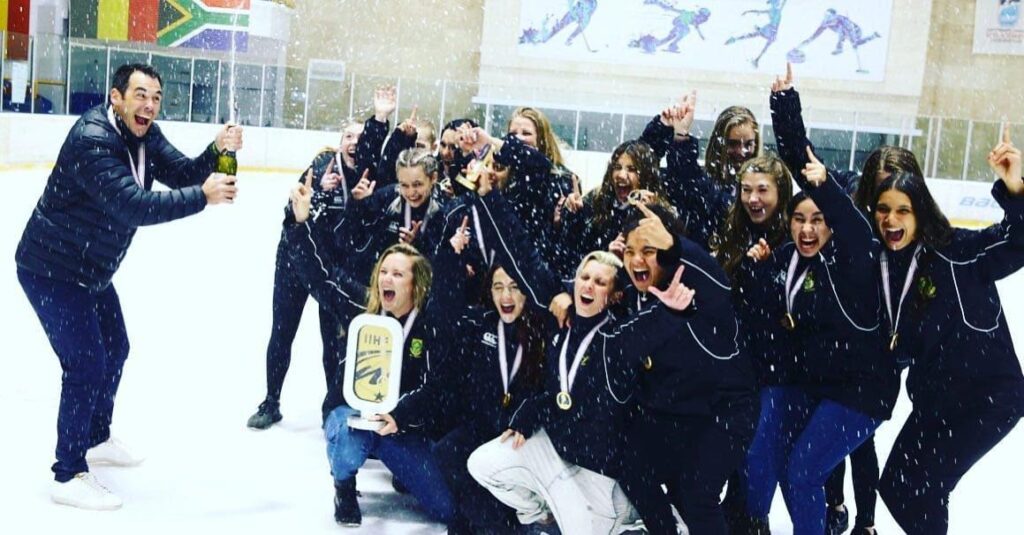
Dalene Rhode is one of the most inspirational players in all of women’s ice hockey. Her long-lasting commitment to the South African National Team since 2011 cannot be ignored. This past season saw the 30-year-old forward be honoured as the team’s captain for a first time. Rhode is South Africa’s all-time leader in goals (36) at the World Championship, while ranked second in points (54), and third in games played (53).
In this interview, Rhode discusses her time playing the sport in South Africa, the development of the country’s national teams, and more about her career accomplishments.
Interview
Q: When did you first begin playing ice hockey and what was your inspiration?
A: I first began my journey on the ice as both a figure skater and an ice hockey player when I was 5.5 years old. Early and late public skating sessions were where it all began for me. Being that young, I didn’t think much of it; I just loved the feeling of gliding on the ice and quickly became comfortable with skating. As I developed my skills in both figure skating and ice hockey, figure skating played a massive role in shaping my skating technique that I continue to benefit from to this day.
Discovering ice hockey at the rink was a natural progression for me. Watching players like Hilary Knight, Kelly Stack, Julie Chu, and Hayley Wickenheiser showcased their speed, skill, and dedication to the game. Hilary Knight, in particular, became my favourite player. Her incredible talent, work ethic, and leadership on and off the ice have been a constant inspiration to me. As I reached my teens, her achievements in the sport motivated me to pursue ice hockey with equal fervour.
I owe my introduction to ice skating to my mother, who took me to those early and late public skating sessions. Her support and encouragement were instrumental. In fact, she was approached to sign me up for skating, which set me on this incredible journey in sports.
Balancing both sports, I dedicated myself to learning and improving in each. They quickly became central parts of my life, each contributing unique aspects to my overall development as an athlete.

Q: South Africa had a difficult season, being relegated from D2B. What must be done to return to that level?
A: Returning to Division II Group B will require a multi-faceted approach. First and foremost, we need to enhance our training programs. This means focusing not just on individual skills, but also on team dynamics and strategies. Ensuring our playersare in top physical and mental condition is crucial, so we’ll be implementing rigorous conditioning programs.
Developing our younger players coming into the team is another priority. By providing more opportunities for these young athletes to train and compete at higher levels, we can build a strong foundation for the future. Additionally, we need to leverage the expertise of our local coaches. They understand the unique aspects of our team and can provide tailored guidance and strategies.
We also need to gain more international exposure. Participating in international tournaments and friendly matches will help our players gain experience and learn different playing styles. Alongside this, developing and practicing strategic game plans tailored to our team’s strengths and weaknesses will be important.
Community and financial support will play a big role as well. Garnering support from the local community and securing sponsorships or funding will ensure we have the necessary resources for training, equipment, and travel.
Lastly, it’s crucial that we learn from our past mistakes. Analysing our previous games to identify areas for improvement will help us make the necessary adjustments to come back stronger.
With a concerted effort in these areas, I believe we can make significant progress and aim for a successful return to Division II Group B.
Q: You spent the 2015-16 season playing for the Bözen Eagles in Italy. How was that experience and how does the level there compare to South Africa?
A: Playing for the Bözen Eagles in Italy during the 2015-16 season was a pivotal experience that highlighted the stark differences between European ice hockey and the women’s game in South Africa. In Italy, I was immersed in a highly competitive environment where hockey is deeply ingrained in the culture. The level of play was exceptional, with rigorous training, advanced coaching techniques, and a strong emphasis on strategic gameplay.
Comparatively, women’s ice hockey in South Africa faces significant developmental challenges. The infrastructure and resources for training and competition are limited, which impacts the overall level of play and coaching standards. South Africa also lacks the exposure to international competition, as our geographical distance from other hockey nations limits opportunities for players to experience and learn from different playing styles and standards. We primarily participate in one international tournament, the IIHF, due to these constraints.
Additionally, funding is a major hurdle that restricts us from gaining more exposure through participation in international tournaments. Unlike the resources available in Europe, securing adequate funding for travel and participation expenses remains a significant challenge for us.
On a personal level, the experience with the Bözen Eagles was incredibly enriching. The team was welcoming and inclusive, involving me in all activities both on and off the ice. Despite the language barrier—since the coach spoke German—I found their support invaluable, especially in helping me understand and execute drills effectively. My ability to interpret and apply the strategies drawn out in drills improved significantly, which enhanced my performance and enjoyment of the game.
My time in Italy not only expanded my hockey skills but also broadened my cultural understanding and adaptability. It was a privilege to be part of a team that embraced diversity and fostered a supportive environment, both of which contributed to my growth as a player and as a person.
Moving forward, I am committed to using my experiences to advocate for women’s ice hockey in South Africa and to help overcome the challenges of funding and international exposure that our players face.

Q: You have represented South Africa since 2011. What has been your greatest achievement(s) with the national team?
A: Representing South Africa since 2011 has been an incredible journey filled with memorable achievements and personal growth. One of my greatest achievements with the national team, and one that every teammate would echo, is winning gold in 2019 in Bulgaria. This accomplishment stands as a pinnacle moment in my career because it symbolizes the culmination of years of hard work, dedication, and teamwork.
Winning Gold in Bulgaria was not just about the medal itself, but the journey and the challenges we overcame as a team. It was a testament to our resilience and determination to succeed on the international stage, despite facing significant hurdles along the way. The victory not only boosted our confidence but also put South African women’s ice hockey on the map, demonstrating our potential and competitive spirit.
This achievement remains a source of immense pride for me personally and for everyone involved in the team. It signifies the progress we’ve made and motivates us to continue pushing boundaries and striving for excellence in every game and tournament we participate in. It’s moments like these that reaffirm my passion for the sport and my commitment to representing South Africa with pride and determination.

Q: Do you believe that ice hockey is developing in South Africa? What could be done to improve the level of men’s, women’s, and junior teams?
A: Yes, ice hockey is growing in South Africa, though it faces unique challenges. To improve our men’s, women’s, and junior teams, we need to focus on several key areas: enhancing infrastructure and facilities, expanding coaching programs, increasing participation through grassroots initiatives, and securing sustainable funding. SAIHA is continually striving to secure more funding, but this remains a significant challenge within our country and federation. Investing in an international coach has proven crucial; for instance, our men’s program recently invested in an international coach, resulting in noticeable improvements in the team’s style and skill level.
Bonus Q: What do you do besides play hockey?
A: Besides playing hockey, I recently started playing padel, and it quickly became my new favourite sport outside of ice hockey. Padel has been a refreshing addition to my activities, offering a different kind of physical and strategic challenge. It’s not only enjoyable but also helps me stay active and improve my coordination, which complements my hockey training.
My mom signed me up for so many sports when I was younger, so I enjoy and try every sport, including hikes, soccer, tennis, and rugby. I’m quite competitive, so any sport I can master, I aim to compete in! (laughs) Exploring these activities has been both fun and rewarding, providing me with diverse experiences and keeping me motivated both on and off the ice.
Bonus Q: Whenever retirement comes, would you have any interest in coaching?
A: Of course, I would love to give back through coaching. Currently, I assist whenever I can, and it’s a role I find incredibly rewarding. My main passion for after retirement, though, will be officiating. If possible, I would love to officiate in international tournaments while still playing, but unfortunately, the rules do not allow for both simultaneously. I’ve been told that I would need to retire from playing internationally to officiate overseas, and that’s a tough decision to consider. In the meantime, I enjoy officiating local games and plan to continue until I can be assigned to officiate at higher levels.

OTHER INTERVIEWS WITH PLAYERS CAN BE FOUND HERE

Interview: Dalene Rhode – Hockey Worldwide
aqrgctkbsh
qrgctkbsh http://www.g21gt6k4x2md9lm1t32vr679o5p889kxs.org/
[url=http://www.g21gt6k4x2md9lm1t32vr679o5p889kxs.org/]uqrgctkbsh[/url]